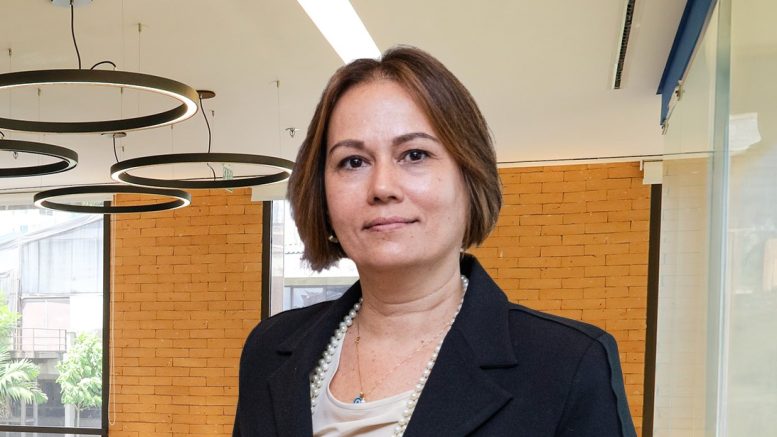“Agribusiness in Brazil plays a fundamental role in solving global challenges of food security and climate sustainability…”
Giovana Araújo is a leading partner in agribusiness at KPMG. Araújo holds a degree in economics from UFBA and an MBA from USP and FGV.
Agribrasilis – You believe that “every food company is also potentially an energy company.” Is bioenergy fully exploited in Brazil?
Giovana Araújo – As demand for sustainable energy accelerates, a wealth of untapped bioenergy in the countryside around the world awaits conversion solutions. So, it is likely that more and more companies operating in agribusiness will also become energy companies. Agribusiness is geared towards this three-pronged approach: food, fiber, and fuel.
In Brazil, agribusiness has expanded its traditional functions of food and fiber production to a broader role as a supplier of modern bioenergy. A study recently published by the FGV Bioeconomy Observatory shows that bioenergy linked to the sector accounted for 29.1% of domestic energy supply in 2023, contributing 60% of the renewable energy consumed in the country. Without agribusiness’ contribution to renewable energy production, the share of clean sources in Brazil’s energy matrix would be close to the global average.
Agribusiness in Brazil has a promising future as a bioenergy provider. Law 14,993, enacted on October 8, 2024, paves the way in this direction. The law integrates the Brazilian government’s energy transition policies and determines the expansion of the use of biofuels such as ethanol, biodiesel, green diesel, BioQAV, and synthetic fuels.
In agricultural operations themselves, there is considerable scope for expanding the use of biofuels to replace diesel, with the use of biogas, ethanol, and biodiesel in heavy vehicles. The Brazilian agricultural sector still relies heavily on fossil fuels in its operations.
Agribrasilis – KPMG has been supporting agricultural exporters in meeting the requirements of international markets. What are the requirements and difficulties of this process?
Giovana Araújo – The challenge of complying with international regulations governing global trade is exponential. Requirements will increase in multiple markets for data that not only informs but also certifies how food, fibers, and fuels are produced. It is therefore a challenge of governance and data security, which needs to be addressed with technology, specialized knowledge, and trust seals.
KPMG has been supporting clients in auditing, assurance, and consulting, with an emphasis on the traceability hub, where KPMG has a partnership with a SaaS platform called OriginsNext. The OriginsNext platform creates a digital twin of the supply chain, connecting data and compliance evidence in an agile and secure manner, while also being discretionary. One of the unique features of the OriginsNext platform is that it was built with a compliance vision that adheres to regulatory requirements, i.e., connecting data and evidence from the entire operation from a product perspective.
One of the biggest challenges in Brazil’s case is that upstream compliance does not necessarily mean downstream compliance, since, in the process of transporting and storing products, cargo from different sources is shared.
“…COP 30 will take place in Brazil will be an opportunity to better communicate to the world the relevance and maturity of Brazilian agribusiness. ”
Agribrasilis – COP 30 will take place in November in Pará. What is the role of agribusiness?
Giovana Araújo – COP 30 is a multilateral forum and, as such, it must remain relevant. The challenges of food security and climate sustainability, to name a few, need to be addressed collectively by many jurisdictions.
The fact that COP 30 will take place in Brazil will be an opportunity to better communicate to the world the relevance and maturity of Brazilian agribusiness. The technological advances in Brazilian agribusiness over the last few decades, which have resulted in exponential growth in agricultural and livestock productivity, have been fundamental in addressing issues such as the need to make agriculture more sustainable, reduce GHG emissions, maintain and regenerate soils, and build resilience to extreme weather events.
Brazil has also innovated in programs to attract capital for sustainable projects, using a blended finance model with the participation of the National Treasury and private banks. Agribusiness in Brazil plays a fundamental role in solving global challenges of food security and climate sustainability, and Brazil has much to contribute to this debate.
Agribrasilis – Why do you believe that consumers are “setting the agenda for agriculture”?
Giovana Araújo – Behind the growing regulatory demands for greater transparency regarding how food, fibers, and fuels are being produced, I believe there is a consumer who is more attentive and concerned about their health and the environment. Agribusiness is a value chain by concept, and at the end of that chain is the consumer. Naturally, that consumer will set the agenda for the entire chain.
READ MORE:

